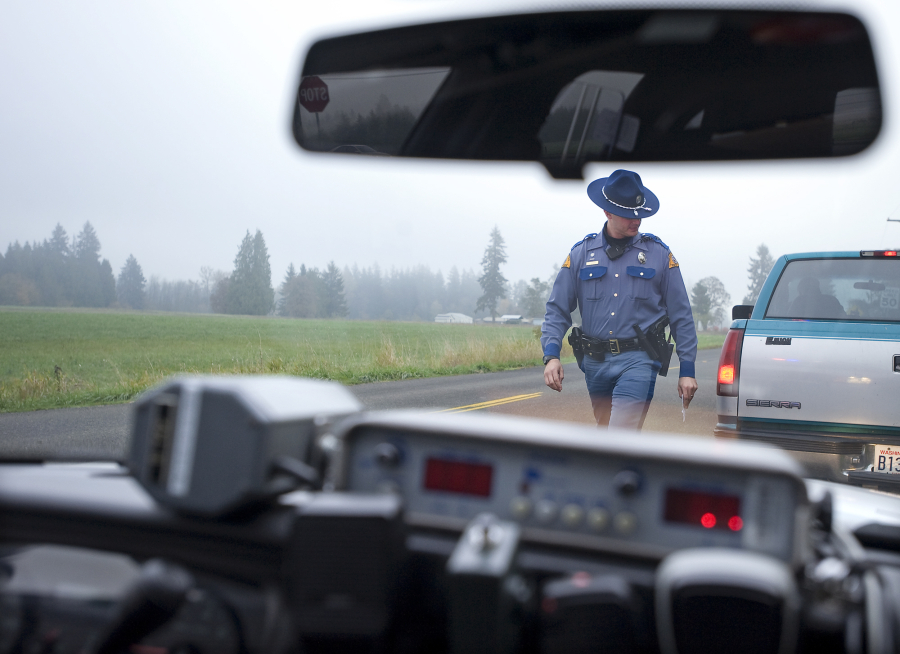Imagine you’re driving. You’re a rational, skilled and safe driver, after all, so of course you’re driving the speed limit.
But not everyone else is as good at driving as you, so you’re keeping with the pace of traffic, to be safe, even if that means exceeding the limit. You and about every other driver out there, according to a new survey from Seattle-based PEMCO Insurance.
The survey, conducted by FBK Research of Seattle, found that about 2 in 3 Washington and Oregon drivers admit to exceeding the posted speed limit at least sometimes. In 2011, half of drivers ‘fessed up to it.
Although drivers may be speeding more, or more willing to admit it, the insurer found most people’s reasoning has been the same for as long as they’ve done the survey: 72 percent of respondents said they speed to keep with the pace of traffic.
Derek Wing, a PEMCO spokesman, said the company regularly polls Oregon and Washington residents, and the “because everyone else is doing it” reasoning is pretty consistent.
“They say, ‘Hey, you know, I’m just going as fast as the person in front of me,’ ” he said.
Kyle Moore, a spokesman at the Washington State Patrol, invoked the “if everyone else jumps off a bridge” analogy, but really, he said, speed limits are set for safety.
“If everyone followed the law, there’d be no need to keep up with the pace,” he said. “Speeding puts yourself and other drivers in danger.”
Out of about 18,600 crashes last year statewide where excessive speed was a factor, according to early data from the Washington State Department of Transportation. In those crashes, about 8,500 people were hurt, and 134 were killed.
About 790 of those crashes last year were in Clark County, the agency said, and 360 people were hurt and another two killed.
According to the National Highway Traffic Safety Association, speeding factored into about a third of all driving deaths nationwide in the past 20 years.
In 2014, speeding was a contributing factor in 28 percent of fatal crashes, which left 9,200 people dead.
“PEMCO’s take, and probably every other insurance company’s take, is that slower is always better, slower is always safer,” Wing said.
Also, according to the insurer’s survey, about 60 percent of Oregon and Washington drivers think there is some kind of “buffer zone” above a road’s stated speed limit.
That is incorrect, but law enforcement officers do have some discretion over the tickets they write.
“Troopers are looking for compliance. They’re not looking to give people tickets,” Moore said. “But that’s not a free pass for you to exceed the speed limit.”
The highest speed limit on Washington roads is 70 mph, though the state has flirted with the idea of upping the speed in some areas.
The state Legislature passed a law in 2015 allowing for raising the speed limit from 70 mph to 75 mph on rural stretches of Interstate 90 in Eastern Washington, if it were deemed safe.
The Washington State Department of Transportation, Washington State Patrol and Washington Traffic Safety Commission last year decided against raising the speed limit, citing safety concerns.
Analyzing what would happen would the limit be raised on I-90 from George to the Lincoln-Spokane county line, the agencies predicted there’d likely be another 1.27 more fatal or serious crashes annually on that stretch of road, and another $8.3 million in extra safety costs.
Also, a speed limit increase likely would save only 5 minutes from a 100-mile trip, and $3.6 million worth of time, the agencies said.
A bill introduced last week, from Sen. Brian Dansel, R-Republic, who has since resigned to join President Donald Trump’s administration as special assistant to the secretary of agriculture, may revive the effort to increase the speed on that stretch of highway.




